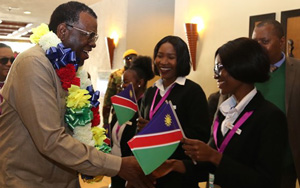
Under whose jurisdiction does a digital worker resorts?

DAKAR – Oxford Professor Mark Graham addressing the 4th UNI Africa Conference warned of the danger of ‘parasitic capitalism’ where digital companies give little back to the places where they are embedded and platform workers are left to fend for themselves.
Drawing from his recently launched paper “Digital Labour and Development” and the corresponding report “The Risks and Rewards of Online GigWork At the Global Margins” Professor Graham said that there are many opportunities and challenges for African workers in the new digital world.
“The geographically dispersed nature of digital work platforms has made it extremely hard to regulate.” he said.
Pillip Jennings for the UNI Global Union “We have to face the reality – the research that has been undertaken by Oxford University, the World Economic Forum, the OECD and others all points to a bleak future of employment which cuts across many sectors.” Jennings said.
Both Professor Graham and Jennings agree that this poses policy questions at all levels. The two experts agree that this needs urgency policy responses.
Graham said, “There is an alternative to the ‘Upwork.com ’ and ‘Mechanical Turk’ model which is unfortunately successfully pushing the platform economy in its image.”
“And we can use what we know about the economic geographies of digital work to envision and strive for an alternate and fairer future for working people in Africa and around the world” he said proposing that concrete solutions must be found to improve the bargaining power of digital platform workers.
He argues that, similar to all other employment that is based in a physical location, digital workers must enjoy equal transparency, work according to best practices, paid a living wag, have appropriate social and economic protection, and have the risk associated with their work, contained.
“There are many who thrive in that environment” Graham said, but the role of labour regulation should be to help the most vulnerable. “We can also use what we know about the socially disembedded nature of this work, to push for more of it to be sourced through firms, social enterprises, non-profits, and of course cooperatives – of the non-platform – variety – that adhere to local labour laws.”
Professor Graham is advocating for a Fair Work foundation instead of a Fairtrade foundation to verify and certify these sorts of things.
One solution offered may be that employment status should be established in the place that a service is actually provided. “Why should an employer based in Germany or the US be able to avoid adhering to labour laws and minimum standards just because they used a digital platform to connect with a worker?” he asked.
He advocates for creating a transnational digital workers’ union: “If we lack the physical proximity that unions traditionally needed, we at least need some sort of shared occupational identity. One explicit role for a digital workers’ union could be building class consciousness amongst the varied workers, part-time, temporary, full-time, entrepreneurs etc.”
Highlighting the precariousness of this work, Graham stressed that workers are receiving many of the risks of entrepreneurship, but few of the rewards, however he is still positive about the future of digital work.












































